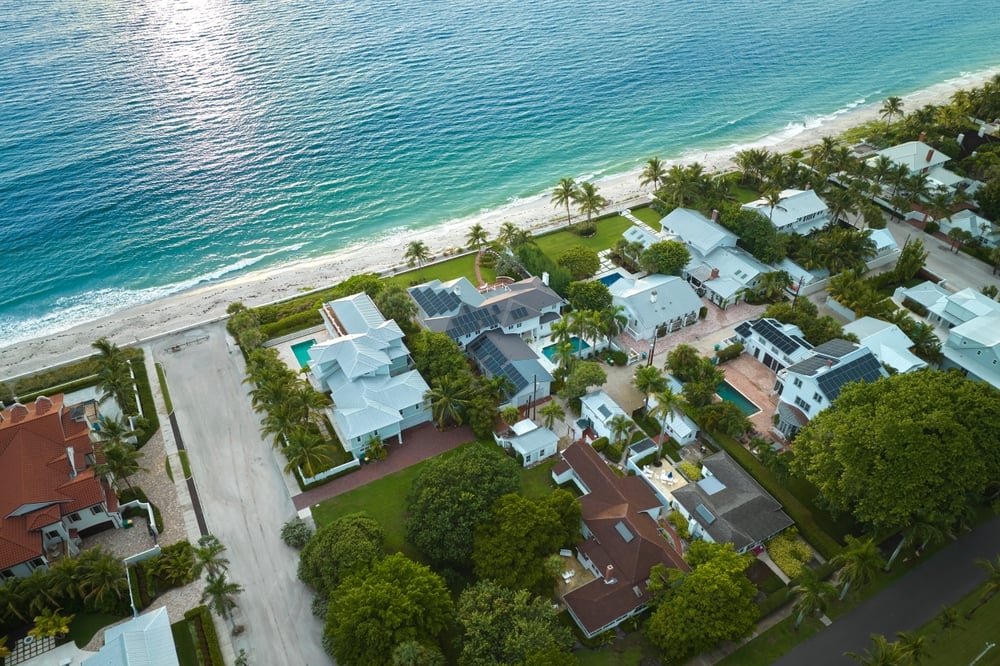International buyers spent $42 billion on US residential properties between April 2023 to March 2024, and ultra-high-net-worth buyers play a significant role in spending in this segment, making substantial investments in high-end property. Many of these are second homes according to the National Association of Realtors, in fact 45% of international buyers purchased properties for use as vacation homes, rental properties, or both.
The countries with the most ultra-high-net-worth individuals buying international property in the US are Canada, the United Kingdom, and China.
Canada’s close proximity to the US makes it an attractive proposition for wealthy Canadians looking to invest, particularly given its economic stability. And property prices in the US are generally lower than Canada, offering better value for money. The weather and lack of income tax in certain states also offer a big incentive.
The UK and the US share a long history of economic and cultural ties, coined as the ‘special relationship’ by Winston Churchill in a 1946 speech, making it a familiar and appealing market, particularly for those running global businesses, as the UK is one of America’s largest trading partners. British investors often seek to diversify their portfolios by investing in US real estate, which is considered a safe and lucrative option. And of course, the lack of language barrier is a bonus.
The US remains a top destination for Chinese property investors, looking to protect their wealth from inflation, especially as the overall number of ultra-high-net-worth in China is growing significantly. As of 2023, China had approximately 98,000 ultra-high-net-worth individuals, this is projected to increase to around 133,000 by 2026, and China ranks second in the world in terms of population growth in this segment.
Get in the Know
Subscribe to our newsletter
Interest in the US amongst international property investors
There has been a significant increase in global wealth, particularly amongst the ultra-high-net-worth. According to the UBS Global Wealth Report 2024, global wealth grew by an average annual rate of 4.5% between 2010 and 2023. Furthermore, global wealth is expected to rise by 38%, to around $629 trillion by 2027. This has led to more buyers with the financial means to invest in luxury properties. With ongoing economic uncertainties, many investors see super-prime property as a lucrative investment as part of a wider balanced portfolio, especially in markets like New York which offer good returns.
Additionally, there has been a renewed interest in urban living post-pandemic, and a resurgence of international travel, as cities reopened and restrictions eased. The stable and transparent investment environment in the US has attracted buyers from regions like the Middle East, who are looking to diversify their investments and increase their exposure to the strengthening dollar.
Several property marketing companies in the US actively run campaigns to attract international super-prime investors, such as Proven Partners, who work with high-end developers across the globe, and Nest Seekers International, who’s super prime division helps global ultra-high-net-worth clients ensure seamless transactions for prestigious properties and luxury assets. So, buying an international property has never been easier.
There are also many tax benefits to buying in the US. Investors can deduct the costs of improving an investment property, significantly lowering taxable income. Interest paid on a mortgage for US real estate is tax-deductible, as are expenses relating to managing and maintaining rental properties. The Internal Revenue Service’s 1031 Exchange also allows investors in some states to defer capital gains taxes by reinvesting in like-kind properties.
Wealth opportunities presented by international real estate
Investing in real estate helps ultra-high-net-worth individuals to maintain a diversified wealth portfolio, reducing the impact of market volatility and providing a spread of assets across classes and geographies.
These properties can generate substantial rental income, providing a steady cash flow for investors, with the average monthly rent for luxury rentals in New York City fetching around $8,900. Super-prime property also tends to appreciate well over time, with annual appreciation for locations like San Francisco reaching as much as 6% in the last decade.
Owning a super-prime property in the US offers the ultra-high-net-worth prestige and status, enhancing the owner's lifestyle and social standing. And for those operating global business ventures, it can provide greater mobility and market access. The United States is widely regarded as one of the greatest business hubs in the world. It consistently ranks as the top destination for foreign direct investment, and cities like New York, Los Angeles, and San Francisco serve as global hubs for finance, technology, and entertainment.
Some US states offer residency programs that allow foreign investors to obtain residency or citizenship through investment. The EB-5 Investor Visa Program, often referred to as the US’s ‘Golden Visa’ provides a pathway to permanent residency for foreign investors who make a qualifying minimum investment.
US cities to consider
New York City continues to be an attractive option for affluent international buyers, due to its long standing as a global financial hub and cultural centre, home to some of the most expensive properties in the world.
Aswell as it’s vibrant lifestyle and beautiful beaches, Miami offers a number of tax incentives for international buyers, with no state income tax, no inheritance tax, and no capital gain tax. Additionally, the Foreign Investment Tax Law allows foreign investors to avoid and protect themselves from wealth tax by structuring their real estate investments properly.
Because of its geographical location, San Diego is popular amongst Asian buyers who may travel frequently between their home countries and the US The city is actively engaged in fostering economic ties with various Asian countries. For instance, San Diego Mayor Todd Gloria recently led a trade mission to South Korea to strengthen economic relationships in industries like biotechnology, clean energy, and semiconductors. The city has a significant Asian population, making up over 17% of its residents, offering unique Asian cultural experiences, from restaurants to festivals. Upscale neighbourhoods like La Jolla, Rancho Santa Fe, and Del Mar are particularly popular.
Cities like Houston also provide a viable alternative for those looking to invest, with a strong job market and affordable housing options, with a lower cost of living compared to other major US cities, whilst Vegas offers an alternative option for those looking to captialise on overseas rental income – fuelled by its booming tourist industry.
How does the US property buying process differ?
Watch out for fees and taxes
Property sales in the US are subject to various fees and taxes and may include stamp duty, recording fees, notary fees, title insurance, appraisal fees, and home inspection fees. Some states such as Georgia, South Carolina, and Alabama require buyers to hire a real estate attorney to handle the paperwork and ensure compliance with local laws. For super-prime property purchase in the US, legal fees typically range from 0.5% to 1% of the property's purchase price. However, this can vary depending on the complexity of the transaction and the specific attorney's rates. And then of course there’s commission; usually around 5% to 6% of the property's purchase price, split between the buyer's and seller's real estate agents. And don’t forget ongoing property taxes, often between 0.5% and 2% of the property's assessed value annually.
Apply for an Identification Number
If you don't already have one, you'll need to apply to the IRS for an ITIN (Individual Taxpayer Identification Number). Foreign buyers must report any income generated from renting or selling US property. An ITIN allows them to file the necessary tax returns. Some US banks require an ITIN to open an account in order to manage rental income or other financial transactions related to the property, and if you have an ITIN, you can claim certain tax deductions as a foreign property owner, as already outlined above.
Check the terms of your agreement
In the US, a property sale becomes legally binding at the point when both parties sign the purchase agreement or contract. This is usually after terms and conditions are agreed, and at this stage an earnest money deposit is due, normally around 1 to 3% of the purchase price. Pull out after this time and you’ll lose your deposit and could face a lawsuit from the seller, so make sure everything is in order with the property you’re looking to buy.
Secure financing options
Securing financing for property purchases in the US can be more challenging for international buyers, particularly those with significant wealth, because of their complex income and asset structures, as well as jurisdictional complications. Furthermore, US lenders have stringent regulatory and compliance requirements that must be met, and providing the required paperwork can be time consuming.
This is where a million plus global property finance specialist can prove invaluable. At Enness Global we’re familiar with the US property market and know the process for international applicants in detail. We’ll help you present the best possible case for your circumstances, and can leverage our excellent relationships with international private banks and lenders to find you the best deal.
The views and opinions expressed in this piece are those of the author and do not constitute advise or a recommendation. Rates and fees noted in this aretile are indictive, and are subject to change and personal circumstances.They do not necessarily reflect the official policy or position of Enness and are not intended to indicate any market or industry viewpoints, or those of other industry professionals.





